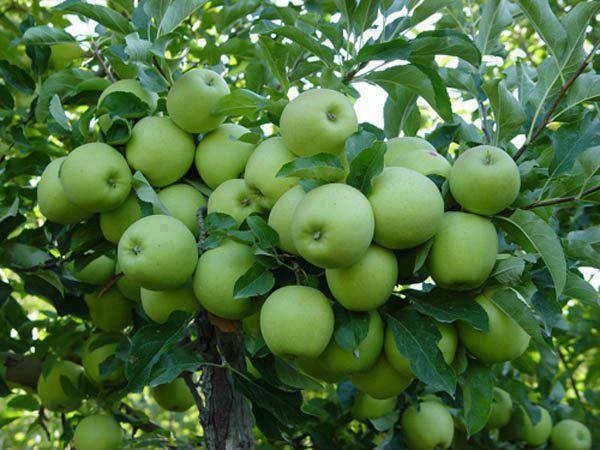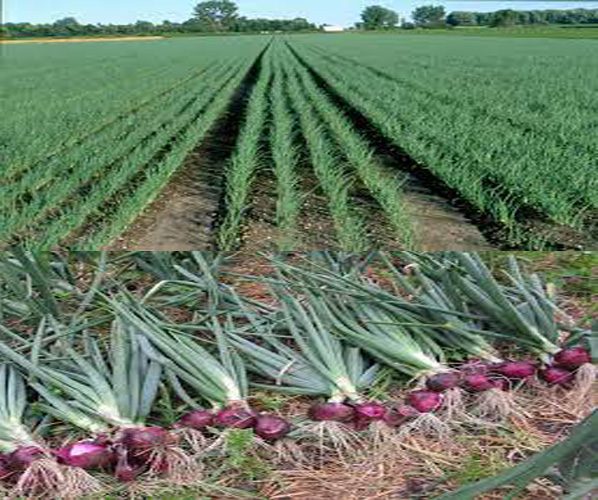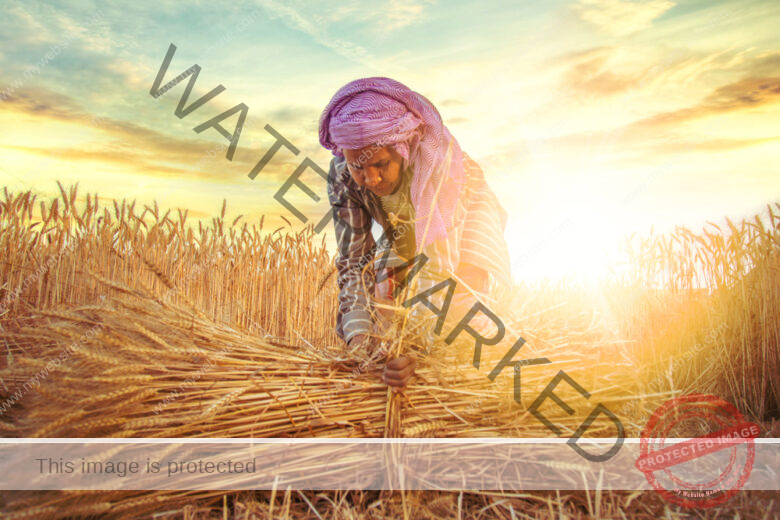Apples are a delicious and nutritious fruit that can be grown in many places around the world, including Nigeria. Growing apples in Nigeria requires careful planning and attention to detail, and importantly with the right climate and soil conditions.
The steps necessary to successfully grow an apple tree in Nigeria, include Choosing the Right Land Area, Choosing the Right and Quality Apple Variety, Clear the Land for Apple Cultivation, Preparing the Soil for Planting, Preparing the Seed Varieties, and so on.
In this guide, we will discuss all the best practices for growing apples in Nigeria, and with a bit of patience and dedication, you can enjoy a bountiful crop of apples in Nigeria.
How To Grow Apple in Nigeria Step By Step Guide
Apples can be grown in Nigeria but, in only few places across the country because of the climatic and soil requirements. If you happen to be in an environment in Nigeria where apples can grow, below are the step-by-step guide you can follow.
Step 1: Choose the Right Land Area
When choosing a land area to grow apples, you should consider factors such as climate, soil conditions, and proximity to other apple orchards. The ideal climate for apple orchards is a mild one, with temperatures that don’t dip below -10°C (14°F).
The soil should be well-draining and rich in organic matter. Lastly, it is best to choose an area that is away from other orchards, as this will reduce the risk of pests and diseases spreading to your crop.
Step 2: Choose the Right and Quality Apple Variety
When choosing an apple variety, consider the flavor, texture, and sweetness you’re looking for. Also, you need to consider also the size and color of apples you’d like for your recipe.
The right apple variety for Nigeria depends on the climate and soil of the region. Some examples of apple varieties that can grow in Nigeria are Red Delicious, Golden Delicious, Granny Smith, and Braeburn.
Additionally, consider purchasing apple varieties that are disease resistant such as Jonagold, Gala, and Fuji will also do well.
Step 3: Clear the Land for Apple Cultivation
Clear the land of any existing vegetation: use a tractor, shovels, and other tools to remove trees, shrubs, and other plant life. Then, level the land: use a disc harrow or other equipment to level the land and prepare it for planting.
Step 4: Prepare the Soil for Planting
Once you have determined the best location for your garden, the next step is to prepare the soil for planting. Begin by removing any existing grass or weeds from the area, then loosening and aerating the soil with a shovel or spade.
Test the soil for soil fertility, pH levels, and other factors to determine the best course of action for apple cultivation. If necessary, mix in some organic compost to improve the soil’s quality, and level out any bumps or dips.
Finally, rake the soil to ensure a smooth and even surface for planting.
Step 5: Prepare the Seed Varieties
Begin by sorting out the seeds according to variety. Ensure you pour the seeds in a bowl of warm water for 24 hours. After 24 hours, remove the seeds from the water and allow them to dry.
Place the seeds in a sealable container with a damp paper towel. The seeds should be stored in a container in a cool, dry place. When ready to plant, soak the seeds in warm water for 24 hours.
Step 6: Plant Your Apple Seedlings
During the soil preparation stage, the soil should be tilled to a depth of 10-12 inches. Dig a hole that is twice as wide as the root ball of your seedlings and about 6-8 inches deep.
Place the seedlings in the hole, spreading the roots out evenly. Backfill the hole with the soil, making sure there are no air pockets. Water the seedlings thoroughly.
Step 7: Proper Watering
Watering should be done regularly during planting. The soil should be kept moist but not soggy. Water should be applied evenly to ensure that all the roots of the plants receive enough moisture. Deep and infrequent watering is recommended to encourage deeper root growth.
After planting, water the tree once per week with 10-15 gallons of water, depending on the size of the tree. Water during dry periods, especially during the summer months. Water deeply to ensure that the water reaches the roots, and add mulch around the base of the tree to help retain moisture. Ensure you monitor the soil moisture levels and adjust the amount of water if there is need.
Step 8: Fertilizer Application
Fertilizers should be applied either in the form of granular fertilizer or in liquid form. The quantity of fertilizer to be applied should be based on the tree’s age, size, and health as well as the soil type and nutrient content.
Also, fertilizers should be applied evenly around the base of the tree, avoiding contact with the trunk and branches, and then watered well after application to ensure good absorption and to prevent fertilizer burn.
Step 9: Prune the Tree
Pruning apple trees regularly is essential to maintain their shape and to ensure a good crop of fruit. Prune the tree just after harvest, when the tree is still dormant.
Step 10: Pest and Disease Control
Apple trees are susceptible to a variety of pests and diseases, so it’s important to check the trees regularly and take measures to protect them. You can employ the use of pesticides, natural pest predators, cultural practices, and prune and disinfect methods to control pests and diseases.
Step 11: Harvest
Within 3 to 4 months, your apple fruits should be ready for harvest.
Variety of such Apple in Nigeria
There are no native apple varieties in Nigeria. However, some apple cultivars that can thrive in Nigeria’s climate include Anna, Dorsett Golden, and Ein Shemer.
These cultivars have been adapted to the tropical climate and can grow well in areas with altitudes of 800 to 1,500 meters above sea level.
How Much Is Such Crop Sold In Nigeria
The price of apples in Nigeria can vary depending on the season, location, and availability.
Apples are often imported from other countries, which can result in higher prices. On average, apples can cost between NGN 500 and NGN 1,500 per kilogram in Nigeria.
Best Agronomic Practices To Engage In Growing Apple In Nigeria
To grow apples successfully in Nigeria, you need to follow the best agronomic practices, which include the following:
- Choose the right apple cultivar that is adapted to Nigeria’s climate and soil conditions.
- Prepare the planting site by removing weeds and other debris, and incorporating organic matter into the soil.
- Plant apple trees in well-drained soils with good water-holding capacity.
- Water apple trees regularly, especially during the dry season.
- Apply appropriate fertilizers based on soil analysis results.
- Prune apple trees to encourage fruit production and remove dead or diseased wood.
- Control pests and diseases using appropriate measures such as biological control, cultural control, and chemical control.
Projected Profit Of Apple In Nigeria
The profit potential of apple farming in Nigeria can vary depending on several factors such as the apple cultivar, production costs, yield, and market prices.
However, with proper management practices and favorable market conditions, it is possible to achieve a profitable apple farming business in Nigeria.
Common Diseases And Pests Of Apple
Apple trees in Nigeria can be affected by several pests and diseases, including:
- Apple scab: This is a fungal disease that can cause brownish-black lesions on the leaves, fruits, and stems of apple trees. To control apple scab, you can apply fungicides, maintain good air circulation around the trees, and remove infected leaves and fruits.
- Codling moth: This is an insect pest that can cause damage to apple fruits by burrowing into them. To control codling moth, you can use pheromone traps, apply insecticides, and practice good sanitation by removing fallen fruits from the orchard.
- Apple maggot: This is another insect pest that can cause damage to apple fruits by tunneling through them. To control apple maggot, you can use sticky traps, apply insecticides, and practice good sanitation by removing fallen fruits from the orchard.
Different Propagation Methods Of Apple
Apple trees can be propagated using several methods, including:
- Seed propagation: This involves planting apple seeds and growing them into seedlings, which can be used as rootstocks for grafting.
- Grafting: This involves joining a scion (a piece of desired apple variety) with a rootstock (a piece of a different apple variety) to create a new tree with desired characteristics.
- Cutting propagation: This involves taking cuttings from an apple tree and rooting them to create new trees that are genetically identical to the parent tree.
- Tissue culture propagation: This involves using specialized laboratory techniques to grow apple trees from small pieces of tissue taken from a parent tree. This method is commonly used to propagate disease-free and high-yielding apple trees.
Why Apples Don’t Grow In Nigeria
Apples do not grow in Nigeria because the climate is not conducive to apple growing. Apples need cold winters and cool, wet springs in order to produce fruit. Nigeria’s climate is tropical, with hot and humid conditions that are not ideal for apples.
Also, apples require well-drained, fertile soil to grow, and Nigeria’s soil is mostly clay and loam and prone to waterlogging. The lack of cold weather and soil that is not suitable for apple trees are two of the major reasons apples do not grow in Nigeria.
Bell Apple In Nigeria
At present, there is no official presence of Apple in Nigeria. However, there are several third-party resellers that offer Apple products. These retailers can be found online or in brick-and-mortar stores in major cities in Nigeria.
Does Apple Grow In Jos
No, Apple does not grow in Jos, Nigeria.
Types Of Apples In Nigeria
Below are the various types of apples in Nigeria.
- Honeycrisp
- Golden Delicious
- Gala
- Granny Smith
- Fuji
- Pink Lady
- Jonathan
- Braeburn
- Rome
- Red Delicious
How To Plant Apple Seed
To plant your apple seed, you should
Step 1: Purchase apple seeds from your local nursery or online.
Step 2: Soak the seeds in water for 24 hours before planting.
Step 3: Plant the seeds in soil that is rich in organic matter and has a pH of 6.0-7.0.
Step 4: Place the seed about an inch below the soil surface and cover lightly with soil.
Step 5: Water the planted seeds regularly and keep the soil moist but not soggy.
Step 6: Place the seedlings in a sunny spot with plenty of air circulation.
Step 7: Fertilize the seedlings with a balanced fertilizer when they are a few inches tall.
Step 8: Prune and thin the tree regularly to maintain its shape.
Step 9: Harvest the apples when they are ripe, usually in the fall.
Why Apples Don’t Grow In Nigeria
Apples are temperate fruit that requires cold temperatures and a specific climate in order to grow. Nigeria’s tropical climate is too warm for apples to produce fruit.
Additionally, apples require a long growing season, and the rainy season in Nigeria is too short to provide enough water for the apple trees to grow. The soil in Nigeria is also not suitable for growing apples, as it is low in nutrients and lacks the right acidity.
Can Apple Grow In Nigeria Nairaland
Yes, apple trees can grow in Nigeria. The climate in Nigeria is favorable for apple cultivation, as long as you have the right soil and adequate water supply. Apple trees need a lot of sunshine, and Nigeria has plenty of that. There are many commercial farms in Nigeria growing apples, so there is potential for more.
How To Grow Apple In Nigeria
#1. Purchase Apple Tree Seedlings
Purchase apple tree seedlings from a nursery or online nursery. Choose appropriate varieties for the climate in Nigeria.
#2. Prepare the Soil
Prepare the soil for planting the apple tree seedlings. This includes tilling the soil, adding organic matter, and removing stones and debris.
#3. Plant the Apple Trees
Plant the apple tree seedlings at the appropriate depth and spacing. Plant in an area that receives full sun and is protected from strong winds.
#4. Water the Trees
Water the trees regularly, especially during dry periods. Water the trees deeply and frequently in the early stages of growth.
#5. Prune the Trees
Prune the trees as needed to promote healthy growth and fruit production. Prune at least once a year and remove any dead or diseased branches.
#6. Fertilize the Trees
Fertilize the trees with a balanced fertilizer once a year. Follow the manufacturer’s directions for application and use appropriate rates.
#7. Control Insects and Diseases
Monitor the trees for signs of insect infestation or disease and treat as needed. Use appropriate insecticides and fungicides to control pests and diseases.
#8. Harvest the Apples
Harvest the apples when they are ripe. Apples should be picked and stored in a cool, dry place.
How To Grow Apple In Nigeria Soil
Grow apples in Nigeria soil is possible, but requires a bit of extra effort. Start by selecting a location that gets at least six hours of direct sunlight each day. Prepare the soil by tilling it to a depth of 8-10 inches, and mix in a 2-3 inch layer of compost.
Plant the apple tree in a hole twice as wide as the root ball and at the same level as it was in the pot. Water regularly, and fertilize with a balanced fertilizer in the spring and summer months. Prune the branches to promote new growth and healthy fruit. Harvest apples when they are ripe.
How To Make Apple Grow In Nigeria
#1. Plant Apple Trees In Suitable Climates
Apple trees require a cool climate and plenty of rainfall for successful growth and fruiting. Nigeria has suitable climates for growing apples in the southern and central regions of the country.
#2. Choose The Right Variety Of Apple Tree
Choose a variety of apple tree that is suited to the climate and soil conditions of Nigeria.
#3. Prepare The Soil
Ensure the soil is well-drained and has a good balance of nutrients. Amend the soil with compost or manure to increase fertility.
#4. Plant The Trees
Plant the apple trees in the spring and water them regularly to ensure proper growth and fruiting.
#5. Prune And Fertilize The Trees
Prune the trees to shape and promote strong growth. Fertilize the trees with a balanced fertilizer to ensure adequate nutrition for robust growth and fruiting.
#6. Protect The Trees From Pests And Diseases
Monitor the trees for signs of pests and diseases, and take appropriate measures to control them.
#7. Harvest The Apples
Harvest the apples when they are ripe and store them in a cool, dry place.
Can I Grow Apple In Nigeria
Yes, you can grow apples in Nigeria. Apples are generally easier to grow in northern climates where the winters are cold and the summers are warm, so if you live in a part of Nigeria that experiences this type of climate, it is possible to grow apples in your area.
Apples need a lot of sunlight and a well-drained soil to grow properly, so finding the right spot for planting is essential. You will also need to prune your apple trees regularly to ensure healthy growth.
Do We Grow Apple In Nigeria
No, apple is not a common fruit grown in Nigeria. It is not grown commercially in the country.
How Can I Plant Apple In Nigeria
#1. Choose A Suitable Location For Your Apple Tree
Look for an area that has plenty of sunlight, good soil drainage, and access to water.
#2. Prepare The Soil
Use a garden fork to loosen the soil in the area you have chosen. Add fertilizer, compost, and/or manure to enrich the soil.
#3. Plant Your Apple Tree
Purchase your tree from a local nursery or online retailer. Plant the tree in the prepared soil, making sure to keep the roots spread out and the trunk straight.
#4. Water The Tree
It is important that you keep the soil moist but not soggy. Water the tree once a week and more often during hot and dry weather.
#5. Prune The Tree
Prune back branches to promote growth and remove any dead or diseased branches.
#6. Fertilize Your Tree
Apply a balanced fertilizer to the tree every few months to promote healthy growth.
#7. Monitor For Pests
Check for pests regularly and take steps to prevent or eliminate any infestations.
#8. Harvest Your Apples
Once the apples are ripe, harvest them and enjoy!
Does Apple Grow In Nigeria
No, Apple does not grow in Nigeria. The country does not have a favorable climate for growing apples. The major fruits grown in Nigeria include oranges, mangoes, bananas, pineapples, and papayas.
Does Apple Tree Grow In Nigeria
Yes, apple trees can grow in Nigeria. Apples are a subtropical crop and can be grown in many regions of Nigeria, including the northern states of Kaduna, Kano and Katsina, as well as the southern states of Osun, Oyo, Ekiti and Ogun. To ensure successful growth, apple trees require well-drained soil, plenty of sunlight, and adequate water and fertilizer.
Conclusion
Following the steps outlined and discussed in this article will help you grow apples in Nigeria successfully. Planting trees in the spring, ensuring proper soil conditions, and providing regular irrigation and fertilizer are essential for successful apple production. In addition, proper pruning, pest and disease control, and regular harvesting are also important for a successful harvest.




